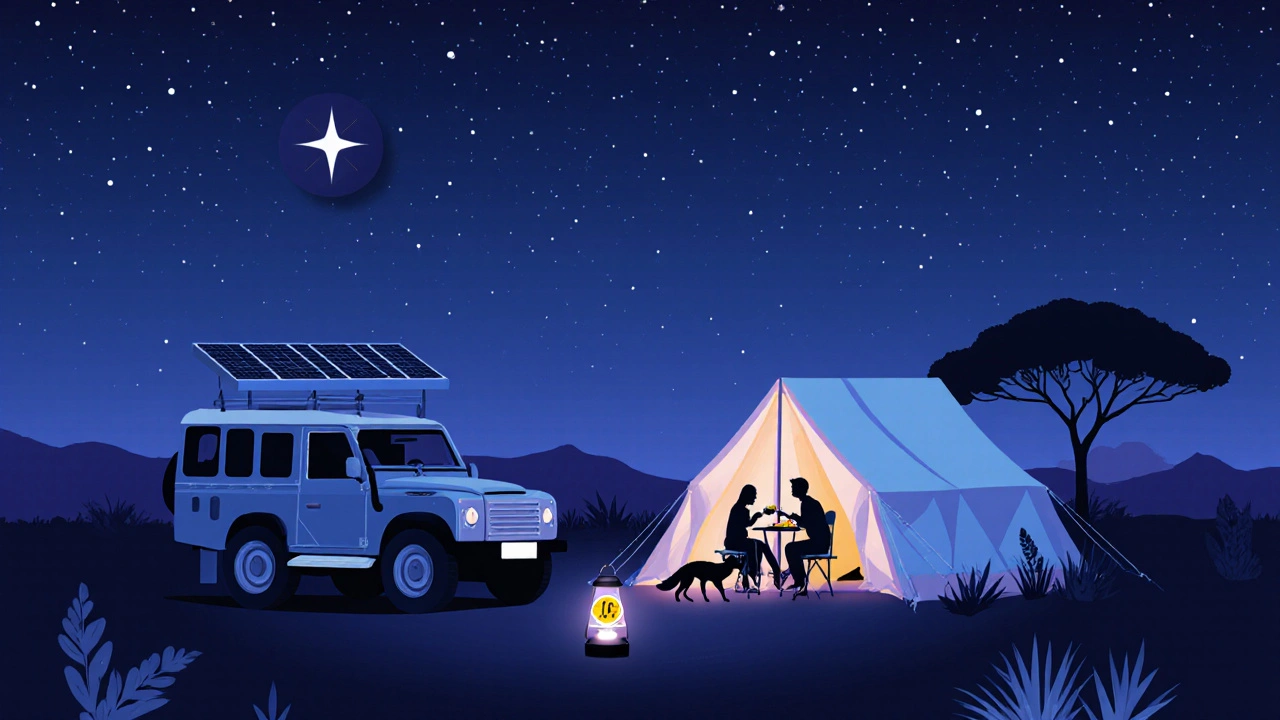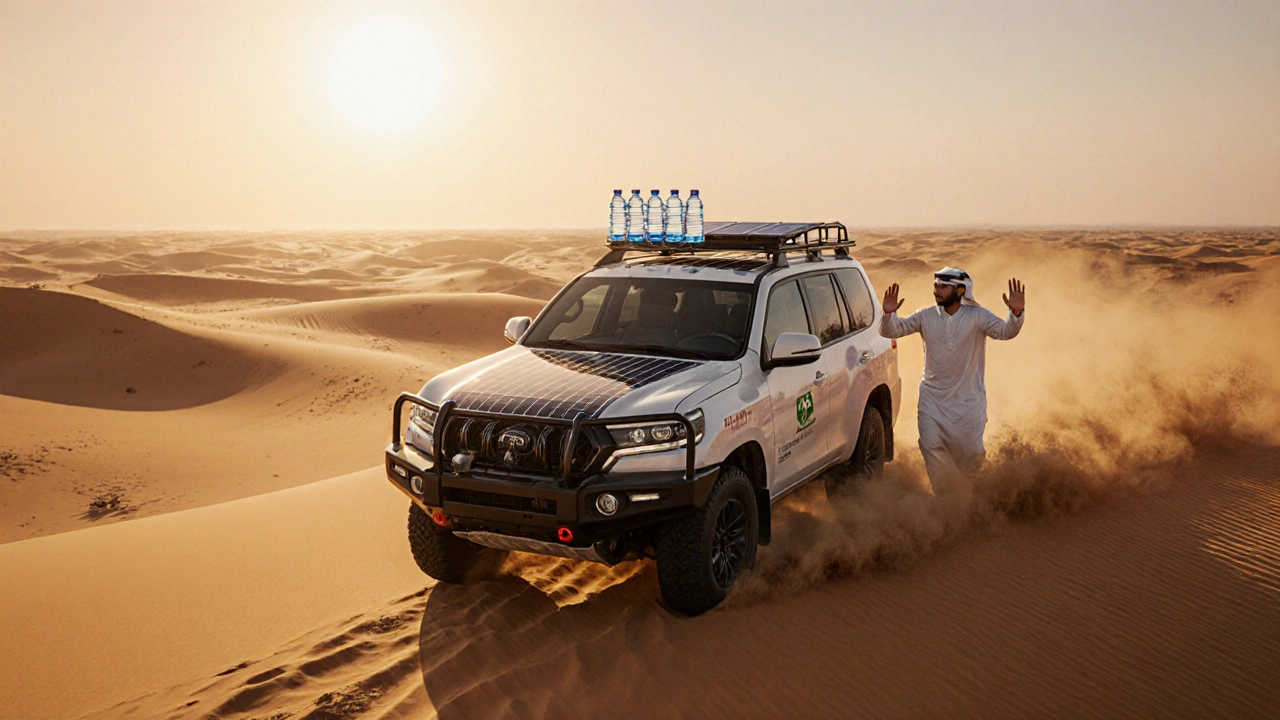Key Takeaways
- Choose operators that use solar‑powered 4x4s or low‑emission vehicles.
- Pack reusable water bottles, biodegradable sunscreen, and a trash‑bag.
- Support local Bedouin guides who follow Leave No Trace principles.
- Offset your carbon footprint with reputable programs.
- Respect protected areas and wildlife corridors to keep ecosystems intact.
Direct Answer
If you want to enjoy a desert safari without harming the fragile dunes, start by picking a tour operator that runs solar‑powered or hybrid 4x4s, brings reusable gear, and works with local Bedouin communities. Follow simple low‑impact habits-stay on marked tracks, pack out all waste, and use biodegradable products. With these steps you’ll experience the awe of the desert while keeping its ecosystem healthy.
Comprehensive Guide to an Eco-Friendly Desert Safari
Desert safaris have a reputation for adrenaline‑packed dune bashing and sunset views, but they can also leave a heavy carbon footprint and disturb wildlife. An Eco‑Friendly Desert Safari is a way to balance adventure with stewardship. Below you’ll find everything from the definition of a sustainable safari to the exact gear you should bring.
Definition and Context
A sustainable desert safari is a guided excursion that minimizes environmental impact while delivering the classic desert experience-dune drives, camel rides, and stargazing. It follows three core pillars: low‑emission transport, waste reduction, and community benefit. By staying within these guidelines, travelers help preserve the delicate desert ecosystem, which includes species like the fennec fox, sand gazelle, and numerous endemic plants.
Benefits of Going Green in the Desert
Beyond the obvious ethical win, a green safari offers tangible perks. Solar‑powered 4x4s run quieter, giving you clearer night‑time sky for stargazing. Local Bedouin guides share authentic stories and often provide traditional meals prepared with sustainably sourced ingredients. Finally, many tours donate a portion of proceeds to desert conservation projects, so your ticket funds re‑planting of native shrubs and protection of wildlife corridors.

Types of Sustainable Desert Safari Experiences Available in the UAE
The UAE offers several green‑focused options:
- Solar‑Powered Dune Bashing: Vehicles equipped with rooftop solar panels that charge on‑board batteries.
- Hybrid 4x4 Tours: Combines a gasoline engine with an electric motor for reduced emissions.
- Eco‑Camel Trek: Uses camels bred under sustainable practices; routes avoid sensitive dunes.
- Night‑Sky Star Camps: Set up in designated low‑light zones with biodegradable camping gear.
How to Find Eco‑Friendly Safari Services in Dubai
Start with a quick online search using terms like “green desert safari Dubai” or “solar 4x4 desert tour”. Look for certifications such as Global Sustainable Tourism Council (GSTC) or local Emirati eco‑labels. Reading recent traveler reviews on platforms like TripAdvisor, especially those mentioning “low emissions” or “Leave No Trace”, helps filter out green‑washing operators.
What to Expect During an Eco‑Friendly Safari
From the moment you arrive, the experience feels different. Guides greet you with reusable water bottles and a brief talk on desert etiquette. You’ll drive along marked tracks that avoid fragile dune formations. Throughout the ride, the guide points out native flora, explains how solar panels work, and shares stories about Bedouin heritage. At sunset, you might enjoy a meal prepared on a portable induction cooker, followed by a stargazing session using a low‑light LED lantern to preserve night‑time darkness.
Pricing and Booking
Green tours tend to be slightly pricier than conventional ones due to the cost of clean tech and community fees. Expect rates between AED 250-350 per person for a 3‑hour session, and AED 400-600 for a full‑day adventure. Most operators allow online booking through their website; look for a clear “Carbon Offset” checkbox during checkout. Booking at least 48 hours ahead secures your spot and gives the operator time to prepare sustainable gear.

Safety Tips for a Low‑Impact Desert Adventure
- Stay hydrated-use refillable bottles and avoid single‑use plastics.
- Apply biodegradable sunscreen (look for “reef‑safe” labels).
- Wear closed shoes with good grip; desert sand can become unstable.
- Follow the guide’s instructions about vehicle speed and track limits.
- Carry a small waste bag to collect any accidental litter.
- Check the weather forecast; avoid tours during extreme heat or sandstorms.
Comparison Table: Eco‑Friendly Desert Safari vs. Traditional Desert Safari in Dubai
| Aspect | Eco‑Friendly Safari | Traditional Safari |
|---|---|---|
| Vehicle Power Source | Solar‑powered or hybrid 4x4 | Diesel‑powered 4x4 |
| Carbon Emissions | Low - approx. 0.3 kg CO₂ per passenger | High - approx. 3 kg CO₂ per passenger |
| Waste Policy | Zero‑single‑use, all waste packed out | Often single‑use plastic, minimal waste handling |
| Community Benefit | Direct payments to Bedouin families, local conservation fees | Limited local engagement |
| Wildlife Impact | Routes avoid protected habitats | Tracks may cross sensitive areas |
Frequently Asked Questions
What makes a desert safari “eco‑friendly”?
An eco‑friendly safari uses low‑emission vehicles (solar or hybrid), follows Leave No Trace practices, supports local communities, and often contributes to carbon‑offset programs or conservation projects.
Are solar‑powered 4x4s as safe as diesel ones?
Yes. Modern solar‑assisted 4x4s have comparable torque and braking systems to diesel models. They also include backup batteries that ensure consistent performance even when sunlight is low.
How can I offset my carbon emissions from the safari?
Many operators integrate offset fees into the booking price. Alternatively, you can purchase offsets from certified programs such as Gold Standard or Verra, targeting projects in desert restoration or renewable energy.
Do I need special clothing for an eco‑safari?
Light, breathable fabrics are ideal. Bring a wide‑brim hat, UV‑protective sunglasses, and a pair of sturdy closed shoes. Pack a reusable water bottle and a small bag for any waste you might collect.
Can I combine a desert safari with other sustainable activities?
Absolutely. Many tour operators offer packages that include dune yoga, solar‑cooking workshops, or visits to eco‑lodge resorts, giving you a full day of low‑impact experiences.
Ready to Explore the Desert Responsibly?
Choosing a sustainable desert safari lets you soak up golden dunes, starry skies, and Bedouin culture without leaving a harmful trace. Scan a few reputable operators, pack reusable gear, and enjoy a travel experience you can feel good about. Your next adventure awaits-green and unforgettable.








Farrah Kennedy
October 18, 2025 AT 17:06Oh great, another checklist for the desert, because apparently the dunes were just begging for a sustainability audit. Picture this: solar‑powered buggies humming like eco‑friendly kettles while tourists clutch their reusable bottles like holy relics. If you’ve ever wanted to feel superior while watching a camel jog past a solar panel, you’ve hit the jackpot. The real adventure is not the dunes but the moral high ground you can flaunt on Instagram. Remember, the only thing you should leave behind is your carbon footprint, not the desert’s fragile soul.
Alek Mercer
November 6, 2025 AT 04:33Your enthusiasm for greener excursions is commendable; adopting solar‑powered 4x4s indeed marks a progressive step. By supporting Bedouin guides you also foster cultural preservation alongside environmental stewardship. I encourage fellow travelers to embrace these practices, as they enhance both the journey and the legacy left behind. Together, we can ensure that desert adventures remain both thrilling and responsible.
William Dean
November 24, 2025 AT 17:00So you think a solar panel on a 4x4 magically erases every sin you’ve ever committed in a Sahara bar. Newsflash: the desert still swallows CO₂ when you kick up dust with a tire. Picking a 'green' operator is nice, but if they still dump plastic bottles in the dunes you’re just swapping one waste for another. Reusable water bottles are great, unless you forget them and end up whining about dehydration. Biodegradable sunscreen sounds fancy, yet you’ll still end up with a white streak on your skin that the desert critters will love to lick. Supporting local Bedouin guides is legit, but make sure they’re not just hired to give you a feel‑good story while your carbon offset is a scam. Carbon offset programmes often feel like buying a guilt‑free chocolate bar and hoping the cocoa farmer does the math right. If you really care, you could travel by camel and whisper sweet nothings to the dunes, but then again, camels also produce methane. The real low‑impact tip is to travel less, stay home, and binge documentaries about dusty horizons. When you finally get to that night‑sky camp, remember the LED lantern is only useful if you don’t instantly snap a photo with the flash. Leave No Trace is a noble mantra, though most tourists interpret it as “I’ll leave my footprints, but not my litter.” Solar‑powered rigs are quieter, which is perfect for hearing the subtle sound of your own conscience screaming. The price tag may be higher, but at least your Instagram story will mention a “sustainable adventure” and earn you those coveted eco‑likes. In the end, the desert remains indifferent to your gadgets; it just keeps shifting sand while you argue about emissions. So pack your reusable bag, your pretentious sense of righteousness, and enjoy the dune while it lasts.
Mark Sullivan
December 13, 2025 AT 05:26What the guidebooks won’t tell you is that those solar panels are often sourced from factories with dubious labor practices, effectively shifting the environmental burden elsewhere. The “green” labels are frequently a front for corporations trying to white‑wash their emissions, and the offset programs are riddled with ghost projects that never see the light of day. By buying into this narrative you’re complicit in a massive greenwashing conspiracy that pretends to protect the very ecosystem you claim to love. Refuse the packaged sustainability and demand true transparency before you set foot on the dunes.
Dan Thornton
December 31, 2025 AT 17:53Choosing a tour that uses low‑emission vehicles helps reduce air pollution and protects the fragile desert environment. Reusable gear and proper waste disposal keep the dunes clean for future visitors. Supporting local Bedouin guides also provides economic benefits to the community.
Jennifer Cacace
January 19, 2026 AT 06:20Absolutely, the synergy between carbon‑neutral logistics and stakeholder engagement is the cornerstone of a closed‑loop desert operation. When you integrate biodegradable SPF formulations with a zero‑waste supply chain, you achieve a true cradle‑to‑grave sustainability model-if you ignore the embodied emissions of the solar cells, that is.
Cass Dixon
February 6, 2026 AT 18:46Indeed, the pretentious commodification of “eco‑luxury” in desert tourism is, quite frankly, an affront to authentic experiential authenticity.